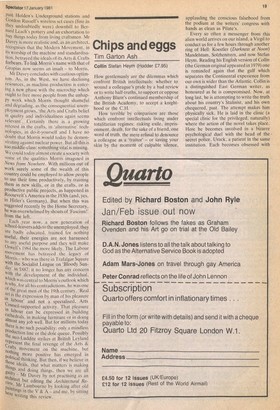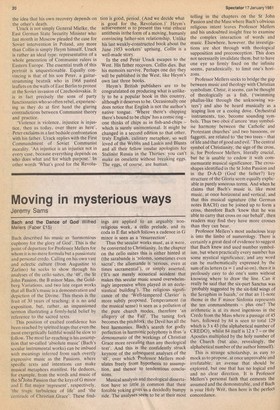Chips and eggs
Tim Garton Ash
Collin Stefan Heym (Hodder £7.95) How gentlemanly are the dilemmas which confront British intellectuals: whether to wound a colleague's pride by a had review or to write half-truths, to support or oppose Anthony Blunt's continued membership of the British Academy, to accept a knighthood or the C.H.
How terrible by comparison are those which confront intellectuals living under totalitarian regimes: risking exile, imprisonment, death, for the sake of a 'friend, one word of truth, the mere refusal to denounce a colleague as a 'traitor' — or saving your skin by the moment of culpable silence, applauding the conscious falsehood from the podium at the writers' congress with hands as clean as Pilate's.
Every so often a messenger from this alien world arrives on our island, a Virgil to conduct us for a few hours through another ring of Hell: Koestler (Darkness at Noon) Mandelstam, Solzhenitsyn, and now Stefan Heym. Reading his English version of Collin (the German original appeared in 1979) one is reminded again that the gulf which separates the Continental experience from our own is wider than the Atlantic. Collin is a distinguished East German writer, as honoured as he is compromised. Now, at long last, he is attempting to write the truth about his country's Stalinist, and his own chequered, past. The attempt makes him physically sick. He is laid in the clinic (a special clinic for the privileged, naturally) where the action of the novel takes place. Here he becomes involved in a bizarre psychological duel with the head of the secret police, Urack, a patient in the same institution. Each becomes obsessed with
the idea that his own recovery depends on the other's death.
Urack is not simply General Mielke, the East German State Security Minister who last month in Moscow pleaded the case for Soviet intervention in Poland, any more than Collin is simply Heym himself. Urack is rather an ideal type: representative of a whole generation of Communist rulers in Eastern Europe. The essential truth of this portrait is unquestionable. Equally convincing is that of his son Peter, a guitarstrumming beatnik who in 1968 pasted leaflets on the walls of East Berlin to protest at the Soviet invasion of Czechoslovakia. It is in fact precisely the sons of party functionaries who so often rebel, experiencing as they do at first hand the glaring contradictions between Communist theory and practice.
'Violence is violence, injustice is injustice, then as today, over there as here', Peter exclaims in a last bedside confrontation with his father. Urack replies with the First Commandment of Soviet Communist morality. "An injustice is an injustice not in every case, because everything depends on who does what and for which purpose.' In other words 'What's good for the Revolu tion is good, period. (And we decide what is good for the Revolution.)' Heym's achievement is to present this vital ethical antithesis in the form of a mdving, humanly convincing father-son relationship. Unlike his last weakly-constructed book about the June 1953 workers' uprising. Collin is a well-made story.
In the end Peter Urack escapes to the West. His father recovers. Collin dies. But his memoirs survive. Perhaps one day they will be published in the West, like Heym's own last three books.
Heym's British publishers are to be congratulated on producing what is unlikely to be a popular book in this country, although it deserves to be. Occasionally one does notice that English is not the author's native tongue. 'Where there's chipping there's bound to be chips' has a comic ring — one thinks of chips as in fish-and-chips — which is surely unintentional. It might he changed in a second edition to that other, truly English, culinary metaphor. so well loved of the Webbs and Laskis and Blunts and all their fellow insular apologists for Stalinist Russia in the Thirties: you can't make an omelette without breaking eggs. The eggs, of course. are human.



































 Previous page
Previous page